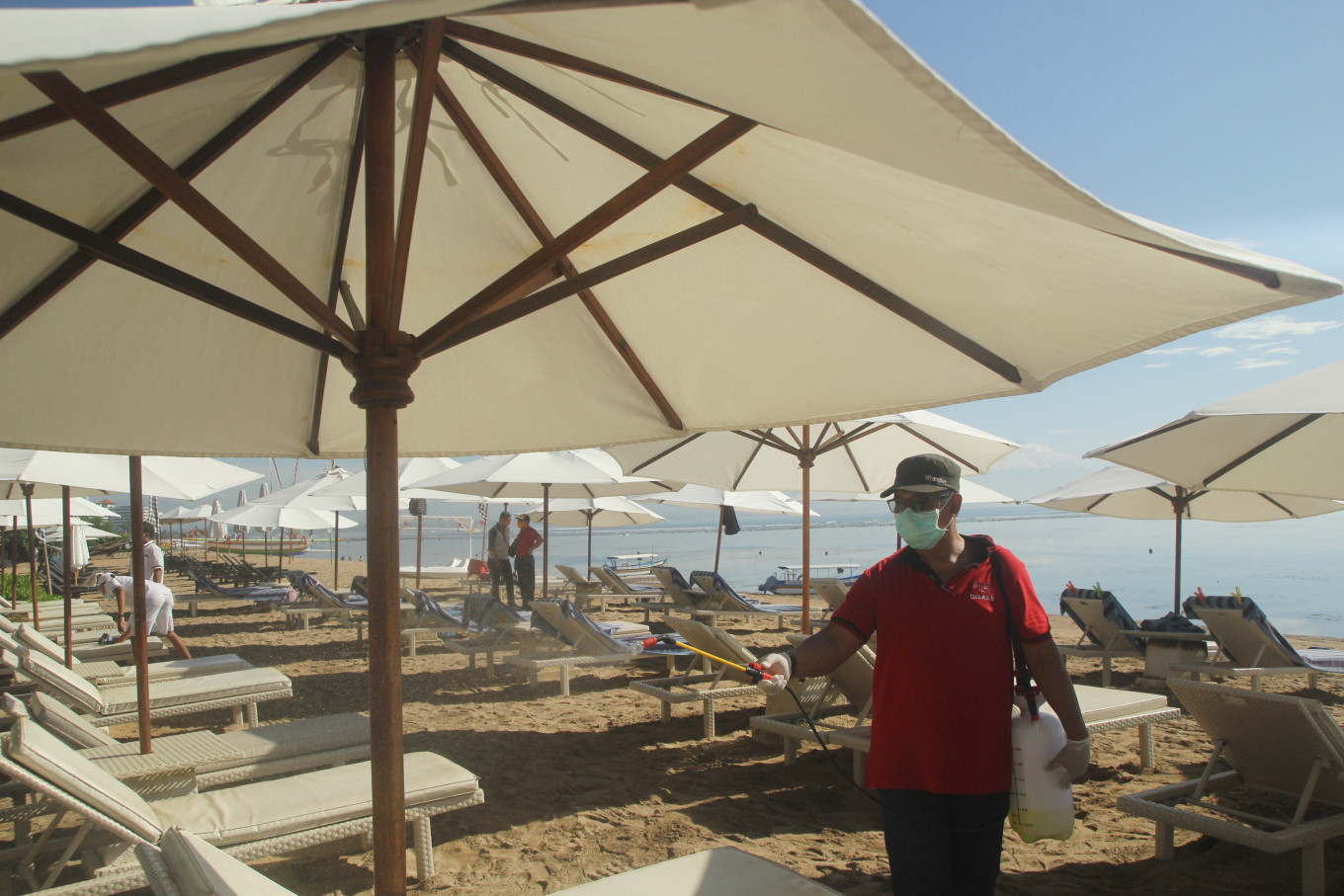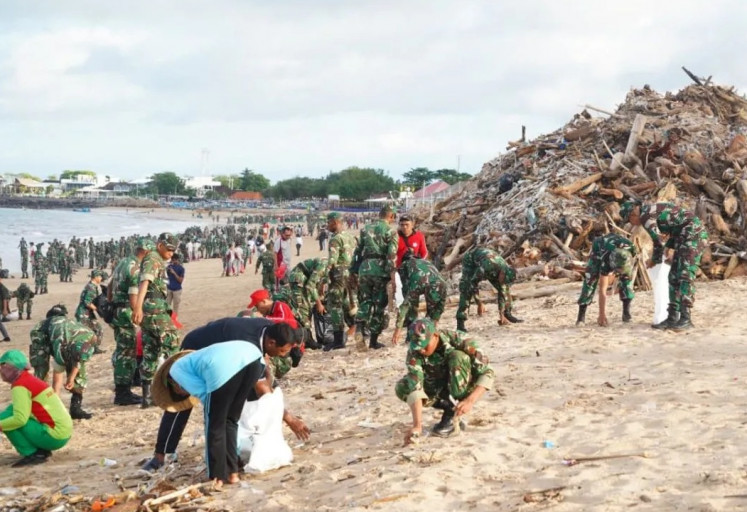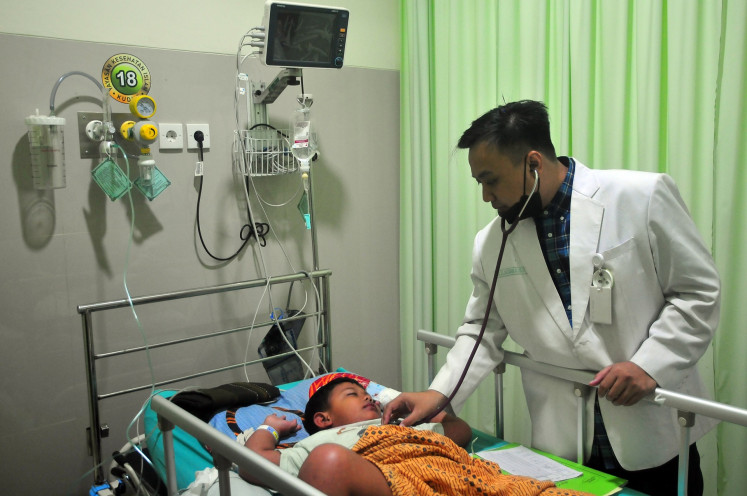Popular Reads
Top Results
Can't find what you're looking for?
View all search resultsPopular Reads
Top Results
Can't find what you're looking for?
View all search resultsEconomic heroes in time of coronavirus
This pandemic is a nightmare for all, but it’s especially hard for those of the undocumented economy. They face difficult choices that most of us will never encounter in our lives.
Change text size
Gift Premium Articles
to Anyone
 Sterilization: A worker sprays disinfectant at Sanur Beach, Denpasar, Bali, on March 15. The Bali administration carried out simultaneous sanitation efforts in cities and regencies across the province by spraying disinfectant at ports, terminals, hotels, markets, tourist objects and public spaces as part of its efforts to contain the spread of COVID-19. (JP/Zul Trio Anggono)
Sterilization: A worker sprays disinfectant at Sanur Beach, Denpasar, Bali, on March 15. The Bali administration carried out simultaneous sanitation efforts in cities and regencies across the province by spraying disinfectant at ports, terminals, hotels, markets, tourist objects and public spaces as part of its efforts to contain the spread of COVID-19. (JP/Zul Trio Anggono)
T
he informal economy is home to many high-risk jobs which attracts people neither for its salary nor security. It draws many with limited choices and resources. As the sector is home to over 60 percent of Indonesia’s workforce, with their struggle and courage, they should be hailed as economic heroes.
Yet many remain a shadow in official figures. And it is at the time like this, when a pandemic shakes up the globe, that we can truly see the consequence of ignoring the informal economy in our country’s statistics.
In developed countries with a small size of the informal economy, it is fairly easy to cope with employment issues during this pandemic. In Britain, the government agreed to pay 80 percent of wages of those not working due to the coronavirus crisis if their employer is unable to afford to pay them. Meanwhile, the Indonesian government is still emphasizing “social/physical distancing”, as it attempts to focus on both keeping the economy afloat and protecting the lives of its citizens.
The livelihood of the low-income workers appeared to be a main concern in deciding against mimicking China’s nation-wide lockdown. What makes it even harder is the spatial distribution of the informal economy. The International Labor Organization in 2018 found that people living in rural areas worldwide were twice more likely to work in the informal economy as the urban populations.
It’s still too early to make a correlation between geography and the risk of getting the coronavirus. However, healthcare facilities in rural areas are significantly lower than urban areas.
When the virus reaches rural areas and infects low-income people in the informal sector they will have far less chance to heal. The damage that the coronavirus continues to produce will eventually worsen conditions in the informal economy and Indonesia is ill-equipped to take care of this matter.
In the cities, while adequate healthcare facilities are just a stone’s throw away, the virus can spread easily due to dense areas and crowded public transportation. What’s more alarming is the increased area of overcrowded urban slums inhabited by most of the poor and informal workers.
The pandemic shows we cannot take the informal economy for granted. It is understandable for the state to invest in large-scale projects such as tourism that can increase the country’s economic growth with the benefits somehow reaching informal workers, whose sources of income crisscross with the tourism industry.
However, if it is possible to make the grand gestures of strengthening economic growth, why is it so hard to document the informal economy?
Data unavailability prevents informed policy. But as clear as it gets, data also allows for saving of lives. Whatever choice the Indonesian government makes is a double-edged sword for the informal workers. It can either ensure that their lives are protected or their jobs are secured, but there is no way that both things can be achieved.
Learning from this tragedy, the government can find ways to measure the economic activities, make them much better accounted for in the national statistics, and most importantly, design a sound social protection mechanism for the informal workers.
If the pandemic comes to pass, our first reaction is to be grateful.
But can such catastrophic impacts be avoided in the future? It’s not about just trying to get back to normal. In the Indonesian case regarding the bulk of its economy, it’s about acknowledging some of the policy failures on the informal economy and ensure the problem will not be repeated.
This pandemic is a nightmare for all, but it’s especially hard for those of the undocumented economy. They face difficult choices that most of us will never encounter in our lives. So the least we could do is to purchase daily necessities from those small, unregistered shops close to our homes.
And when this is all over, hopefully we will see a rebirth of the informal economy. Not in terms of how they operate, but in changed perspectives of how the informal economy should be defined. It is an alternative, not a secondary economic sector. Most importantly, policymakers should finally start to work on redesigning the informal sector, starting with documenting the actors, their work and contribution.
***
PhD student at The London School of Economics and Political Science









